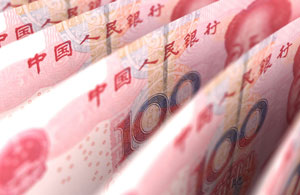Is Currency Appreciation to Blame for China’s Slowdown?

If China’s economy is highly dependent on exports, as many believe, keeping the value of its currency low is important for the country’s economic growth. A recent Economic Synopses essay by Economist Paulina Restrepo-Echavarria examines the relationship between China’s economic slowdown and its currency appreciation.
Over the past few years, the yuan (CNY) has gained value against most currencies. As the author pointed out, in trade-weighted terms, the CNY is at an all-time high. Such a move by the currency makes Chinese exports more expensive, which hurts the country’s competitiveness in world markets. Restrepo-Echavarria noted: “If this change in prices translates to a decrease in exports and a sufficiently high fraction of China’s gross domestic product (GDP) growth depends on the growth of exports, then the currency appreciation can translate to an economic slowdown.”
She evaluated this hypothesis by looking at two decompositions:
- China’s GDP into all its main components
- China’s GDP growth into the growth rate of all its components
Regarding the first decomposition, exports accounted for at most 35 percent of China’s GDP in 2006, and their importance has decreased over the years, especially compared with investment and private consumption. Regarding the second, the contribution of net exports to GDP growth has oscillated during China’s slowdown, which started in 2010. (Figures showing these statistics are available in the Economic Synopses essay, “China’s Slowdown: Is Currency Appreciation to Blame?”)
Restrepo-Echavarria noted that two facts suggest that the exchange rate appreciation is not to blame for China’s slowdown:
- Investment and consumption seem to be much larger drivers of China’s GDP growth than exports.
- The contribution of the growth rate of net exports has not shown a systematic decline since the start of the slowdown.
She concluded: “At least this is the case when one thinks about the simplest direct channel through which a currency exchange rate can affect growth: A currency appreciation makes exports more expensive, exports shrink by a large amount; and if they constitute a large share of GDP, then GDP growth will suffer.”
Additional Resources
- Economic Synopses: China’s Slowdown: Is Currency Appreciation to Blame?
- On the Economy: The Great Housing Boom of China
- On the Economy: Why Does the U.S. Have Such a Large Trade Deficit with China?
Citation
ldquoIs Currency Appreciation to Blame for China’s Slowdown?,rdquo St. Louis Fed On the Economy, Oct. 20, 2015.
This blog offers commentary, analysis and data from our economists and experts. Views expressed are not necessarily those of the St. Louis Fed or Federal Reserve System.
Email Us
All other blog-related questions

